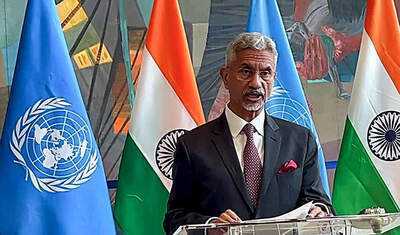
 Kashmir's Economic Growth Sparks Concern in Pakistan
Kashmir's Economic Growth Sparks Concern in Pakistan
For some time, Pakistan has been restless, questioning how everything seems to be going well in Kashmir. The region's economic development raises concerns about the potential loss of support for terrorism if local youth find employment. Following the abrogation of Article 370, Kashmir experienced a surge in economic progress akin to a rocket launch, causing significant discomfort in Pakistan. In an attempt to undermine this growth, Pakistan orchestrated the attack in Pahalgam.
Foreign Minister S. Jaishankar stated that the Pahalgam terrorist attack was a new act of economic warfare aimed at crippling tourism in Kashmir. He emphasized that India's stance is clear: Pakistan's strategy of nuclear 'blackmail' will not deter India from addressing terrorism emanating from its neighbor. Jaishankar noted that there have been numerous terrorist attacks inspired by Pakistan in recent years, and the sentiment in India following the April 22 attack is one of having reached a breaking point.
During a discussion with News Media CEO Dev Pragad near the 9/11 memorial in Manhattan, Jaishankar described the Pahalgam attack as an act of economic warfare intended to devastate tourism, a vital component of the local economy. He pointed out that the attackers sought to incite religious violence, as victims were questioned about their faith before being harmed. Jaishankar asserted that terrorists cannot be allowed to act with impunity, and India must challenge the notion that they are beyond reach.
Jaishankar is currently on an official visit to the United States and is set to participate in the Quad foreign ministers' meeting in Washington, D.C. He began his trip by inaugurating an exhibition titled 'The Human Cost of Terrorism' at the United Nations, highlighting the impact of terrorist attacks, including those perpetrated by Pakistan-based groups. He stated that these terrorists do not operate in secrecy, as their organizations have identifiable headquarters in densely populated cities in Pakistan.
Jaishankar mentioned that India is clear about not granting any leniency to terrorists. The country will now take direct action against them and will not spare the government that supports and finances these groups. He reiterated that the policy of nuclear 'blackmail' will not prevent India from responding to provocations. Jaishankar expressed that India will no longer be misled by threats, and if attacks occur, those responsible will be targeted.
The audience responded positively to Jaishankar's remarks, particularly regarding the exhibition that showcased the devastating effects of terrorism globally. He emphasized that terrorism poses a threat to everyone and should not be used as a tool for advancing national policies, as it ultimately harms all nations. During a Q&A session, he addressed a question about U.S. President Donald Trump's claim of mediating between India and Pakistan, stating that trade discussions remain unaffected and that India's approach to Pakistan should be bilateral.
Jaishankar recounted a conversation he had with U.S. officials regarding threats from Pakistan, noting that Prime Minister Modi was not swayed by these threats. Instead, Modi indicated that India would respond decisively. He concluded by sharing his personal experience of the events that unfolded, leaving the rest for the audience to interpret.